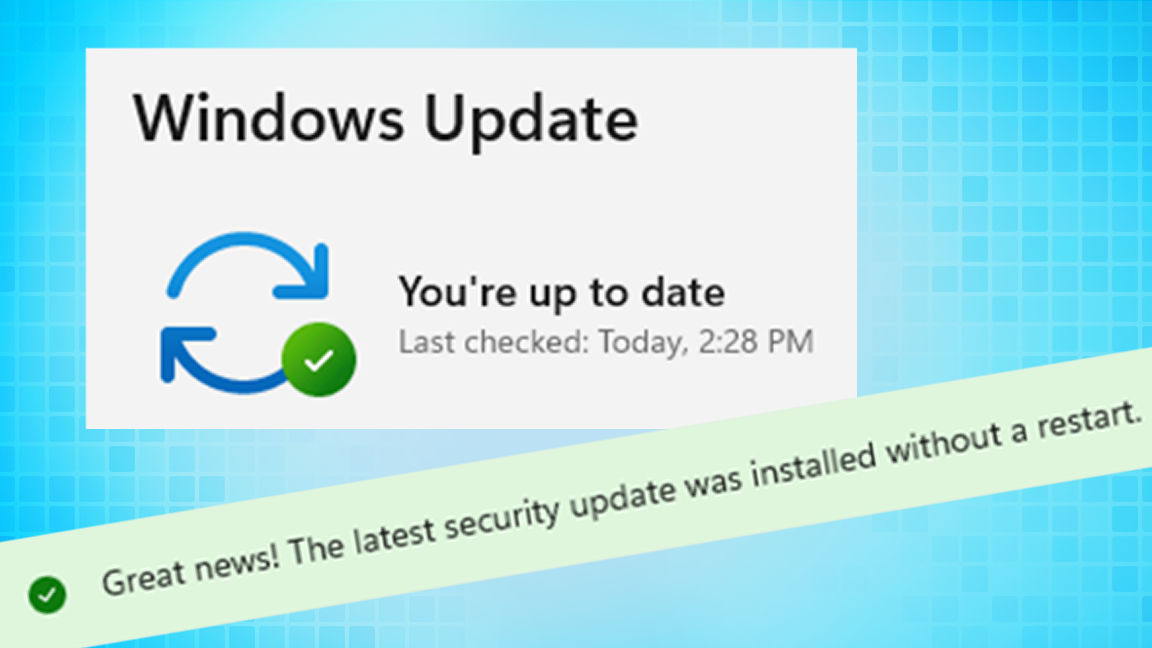Windows 11 Enterprise machines can now get updates while you work—no reboot required

Microsoft has officially announced the release of hotpatch updates for Windows 11 Enterprise builds. This new updating protocol is currently for Enterprise 11 versions 24H2, which applies to AMD and Intel x64 devices. This isn't the first time the new hotpatching system has been mentioned, but it is the first time it's become widely available across Windows 11 Enterprise 24H2 devices.
If you're new to the hotpatching system, the biggest takeaway is the ability to apply updates without the need to restart. This is definitely ideal for corporate environments, letting users continue to work not only without the interruption caused by a reboot, but also without excessive CPU usage.
There are quarterly updates that will likely still require a reboot outside of the regular hotpatch updates. Still, this is a significant change compared to the monthly reboot requirements presently in place.
Word of the new hotpatch system first came to our attention in February of 2024. And by November, we got a glimpse at the new protocol in Windows 11 Enterprise 24H2 and Microsoft 365 Preview builds. It's taken a few months to iron out the details but we've finally hit an official release.
In the blog post, Microsoft details the requirements necessary to enable hotpatching on Windows 11 Enterprise clients. In summary, you will need:
- A subscription to Windows 365 Enterprise, Windows 11 Enterprise (including E3, E5 or F3) or Windows 11 Education (either A3 of A5 will suffice)
- A client running Windows 11 Enterprise 24H2 (specifically build 26100.2033 at minimum) with the latest baseline update
- Visualization-based Security (abbreviated as VBS) will need to be activated
- An AMD Or Intel x64 processor
Arm64 devices are in public preview and require a registry key modification to support the new hotpatch update system. You can read more about the specific steps to adjust this setting in the official blog post.

Microsoft goes on to explain that the hotpatch updates will align with the standard update schedule, which will still apply to Windows 10 and Windows 11 23H2 devices. There will be a different KB number for the hotpatch releases. The team also confirmed in the blog post that the Windows quality update policy will be able to automatically detect whether or not your device meets the necessary requirements to enroll in the hotpatch update system.
Again, it's important to note that this rollout is only for Windows 11 Enterprise clients and is not available for Windows 11 Home and Windows 11 Pro machines. You can read more about the new hotpatch system update protocol over at the official Microsoft blog.
Get Tom's Hardware's best news and in-depth reviews, straight to your inbox.

Ash Hill is a contributing writer for Tom's Hardware with a wealth of experience in the hobby electronics, 3D printing and PCs. She manages the Pi projects of the month and much of our daily Raspberry Pi reporting while also finding the best coupons and deals on all tech.
-
abufrejoval Reply
Mrs. Hill, you may want to change the phrase "Visualization-based Security" to "virtualization-based security".Admin said:Microsoft has announced the official release of hotpatch updates for various Windows 11 Enterprise builds, allowing users to update their machines without needing to restart.
Windows 11 Enterprise machines can now get updates while you work—no reboot required : Read more
Thanks for the full belly laugh, though, and perhaps the inspiration: I really tried to imagine if there was perhaps a new IT based variant to a full code transparency security option, which would make human intelligence irrelevant for code security. -
abufrejoval Reply
Yes, M$ are very late to the game. AFAIK M$ has rarely ever been very successful with ground-breaking innovation, they much more of a copycat (or simply bought the VMS architects).Ful4n1t0c0sme said:Wow! Like GNU/Linux from 20 years ago to now!
But GNU (Hurd) and Linux used rather different approaches to that issue, only Hurd has the 20 year lead but sunk into obscurity, while Linux started mainstreaming that much later with Oracle's Unbreakable quite a bit later and initially rather exclusive to their variant. And it could have been Solaris first... -
Heat_Fan89 Reply
Once upon a time this was common on OS X. Now you apply security updates in macOS and it sometimes becomes reboot city. Linux now has joined the club. I recently installed some system updates to Ubuntu LTS and it required a reboot.Ful4n1t0c0sme said:Wow! Like GNU/Linux from 20 years ago to now! -
Reply
Outside the corporate server world anything that touches the kernel or a library in active use will, for the most part, always require a reboot to clean things up.Heat_Fan89 said:Once upon a time this was common on OS X. Now you apply security updates in macOS and it sometimes becomes reboot city. Linux now has joined the club. I recently installed some system updates to Ubuntu LTS and it required a reboot.